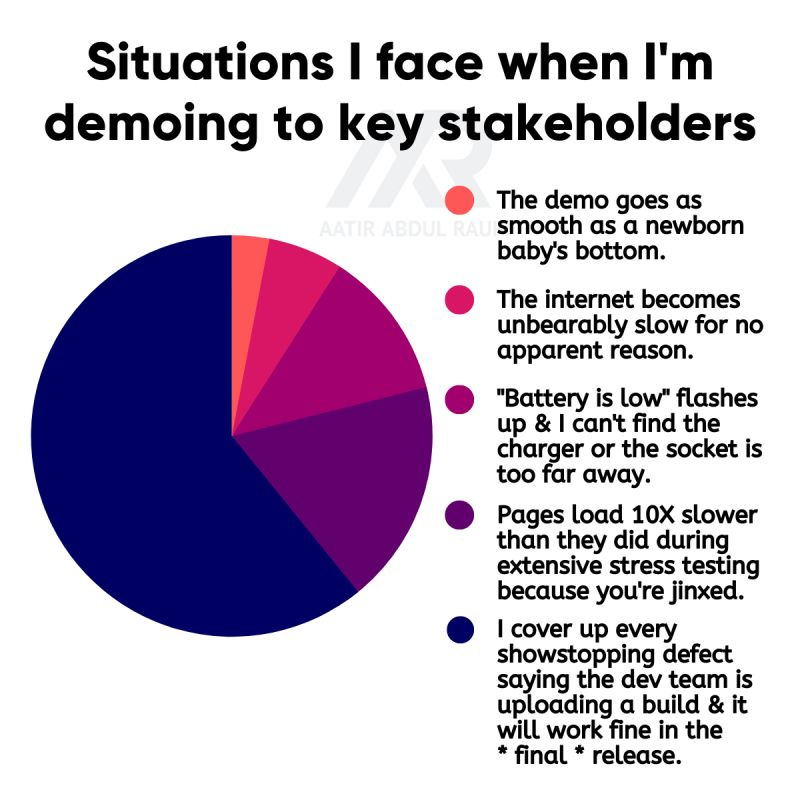3 Questions I've stopped asking as a PM after demos
+ Should PMs be expected to give customer demos to help sales?
Do you get into product demos with your sales teams?
After you’ve delivered a demo, I find the short window after to be a great opportunity to get real-time feedback first-hand from the customer.
However, this means asking the right questions.
This chance to learn can easily be wasted by conversing on points that don’t signal any meaningful validation.
Thus, here are 3 questions I've stopped asking as a PM after delivering a demo.
1- Do you like the feature?
2- Will you use it in the future?
3- Is it clear to you?
In all these cases, the customer will resort to saying some form of “yes” but it hardly means much from a product perspective.
1- Do you like the feature?
Many customers will say “yes” out of respect and to be polite. Yes, some might elaborate on what can be improved, however, very rarely would someone push back, ideate on the core idea (unless you ask them to pay up for it).
If it’s a feature that they are bound to get for no additional cost, “shiny object” syndrome kicks in. Very few would reject a free trinket.
2- Will you use it in the future?
This is a vague question the answer to which depends on several factors: how the feature works, how core it is to their business, how easy it is to learn etc.
A “yes” on this question may well translate to “we’ll give it a try” which isn’t good enough.
3- Is it clear to you?
The objective of this question is to usually understand if they know how the feature will work. Some prospects will understand the premise and respond positively. But EVEN if they didn’t get true clarity, they would nod and move on. No one wants to appear dumb. Passive participants & silence in demos is usually not a good sign.
So, what question can one use instead?
To get more useful feedback, I first answer their questions/objections after the demo ends.
Then, I resort to these that throw the ball into their side of the court:
1) What stood out to you the most? Why?
This helps you arrive at the areas that resonated with the prospect the most & what part they are the most clear on. The open-ended question also helps check whether they were even paying attention.
Ex: when I demoed a hiring product (applicant tracking system) to a recruitment agency, they felt the integrations we had with job boards stood out to them the most.
2) What existing problem can this solve for you?
If they are able to tie with an existing challenge they face, that’s a great sign. That note should be documented for future conversations. Remember - it’s perfectly alright for them to respond in the negative. That’s learning too.
Ex: the agency mentioned that they were not able to get enough reach for their job postings because they lacked in distribution.
3) How do you solve [the problem this product addresses] today?
This question throws light on how severe the issue is. Are they solving this problem today? If yes, what do they use today? This helps me understand how I can position my product as a better alternative.
Moreover, if they are not solving this problem today, it’s critical to understand why. Is it not that urgent OR have they been incurring some sort of “loss” due to lack of practical options?
Ex: the recruitment agency shared that they would periodically buy packages from job boards like Indeed or Glassdoor and then manually post jobs there that took a lot of time & was effort-intensive.
In other words, the aim is to get them talking so that you can probe into their mental state. Their feedback will give you clues on where the product does well & where the gaps are.
Want a bonus trick? Here’s a neat one that a top sales rep taught me:
When the customer ends their monologue, extend your pause & nod.
Silence makes people uncomfortable. Sometimes, they'll divulge things they were keeping close to their chest and might give you more details on their problem.
Asking the right questions after demos expose what you need to improve on in future sessions and possibly even inform product marketing teams to preemptively address common objections in their messaging.
Now, this brings us to a more foundational question.
Should Product Managers be expected to give demos to customers in the first place?
There are schools of thoughts that sit on both sides of the fence.
And my answer is admittedly a cop-out. I’ll go with “Yes & No”.
You see - as a B2B SaaS Product Manager, it was common to get roped into product demos.
The sales rep request would often be on the lines of:
❗ "Hey, it's a massive customer logo. Huge $$$."
❗ "Bro, they have some technical requirements, security questions etc."
❗ "They need estimates on their customizations."
Since revenue growth was a towering priority, this left the team in a dilemma.
💡 Option A: To maximize chances to close this deal, send the most knowledgeable person about the product i.e. the Product Manager.
💡 Option B: Start building expertise in the sales team to deliver demos by exposing them to opportunities to learn & take over from Product Managers.
Option B was rarely chosen because there was little motivation in going the hard route.
As a Product Manager working in a lean team, I also think some of my Impostor Syndrome kicked in. Product Demos were an easy way to "justify" my presence & assign an ROI to myself by helping close deals.
Furthermore, a part of me wanted to convey accurate expectations to the client rather than have sales reps over-commit or misrepresent something - which could eventually lead to headaches during implementation phases.
This might work in the initial stages.
However, I learnt the hard way, that excess demos can eventually burn out a Product Manager & adversely impact the product direction.
Not only do product tasks get backlogged but your product decisions tend to become very sales-driven.
Thus, Product Managers should:
✅ Collaborate on formulating a meaningful live demo flow & script.
✅ Train sales reps on the demo by letting them shadow them.
✅ Hold monthly sessions to de-brief them on new features.
So, yes - in the medium/long run - I feel a sales team needs to step up & learn the ropes.
With training & access to sanitized demo environments, it's very possible to deliver demos independently.
Ex: Think of a car salesman at a showroom.
When you walk in to inquire about a car, they are fully equipped to take all your questions. They know about the laundry list of features & are aware of differences between trims & models.
But you don't see them contacting the factory to ask about tech specifics.
That's just a result of training & practice.
Now, having said that, there are some reasons that Product Managers could still accompany pre-sales for a demo:
👉 When you're dealing with a significant customer that truly has complex implementation requirements. The difference, however, is that the sales person should still deliver the basic demo while the PM takes on the curveballs.
👉 Occasional demos help a PM stay in touch with the market, common objections & emerging customer needs - great intel to power product decisions.
👉 It serves as an opportunity evaluate product pitches by new sales staff & assess how USPs are being conveyed in the field.
Finally, as we wrap up this topic of demos, I thought I’d share a funny pie chart graphic summarizing my woes when I’m delivering screen shares to potential clients & even my own higher-ups:






Great article - I love the small tidbits like pausing and nodding or the graphic at the end. In my experience, once the sales team knows how to demo the product, they don't always want a pm joining a pre-sales demo since they think it could slow down the process. Have you experienced that? If so, what is your advice on how to solve it?